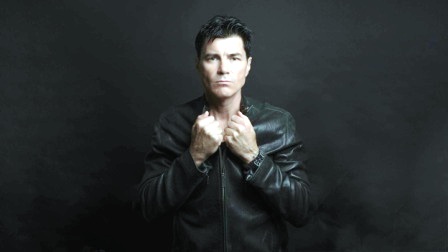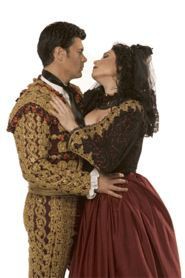Surely planned before Trump-Putin seeped its way into international political conversation, Florida Grand Opera scheduled Russian opera, "Eugene Onegin," by Pyotr Ilyich Tchiakovsky as part of its 2016-2017 season.
"Onegin," as the FGO says, is arguably Tchaikovsky’s most beloved and most famous opera. A feverishly passionate story, which unfolds through the melodic music that characterize Tchaikovsky’s work, it is, as opera scholars say, the perfect example of Russian Lyric Opera.
This marks the first time in 17 years that "Eugene Onegin" has been staged at Florida Grand Opera.
We spoke with Franco Pomponi, the baritone who is cast in the title role in Florida Grand Opera's production about the role, Pomponi's storied career in opera, and what he's learned from the best.
Franco Pomponi, baritone, sings the role of Eugene Onegin.
miamiartzine.com: The plot of the opera concerns the narcissistic young Onegin, who spurns the affections of a sensitive young girl and turns a pistol on his best friend in a fatal duel. Years later, reunited with his now-married former admirer, he endeavors to rekindle true love. Tell me about Onegin and what draws you to this role.
Franco Pomponi: "A friend brings Onegin to a house and there are two girls there. It's like a blind date, in a way. At first, he's standoffish. He has this attitude that: 'I'm a rich city kid and I can tell you everything about life.' In the first aria, he gives the girl a sermon about what real life is. He's in his 20s and she's in her teens and she's mortified. She's opened up to him in a love letter. He acts noble, but he does it coldly. At the end of the opera, he realizes what a jerk he's been and all of the trappings of his life fall away. In the end, it's too late. She's now married and can't go with him. He sees the agony and despair of his own arrogance. He has not only hurt himself, but in the end, he's hurt others. This show is really beautiful. This is a super passionate opera. The music is haunting and catchy. Right from the beginning, you're humming the melody. It's haunting."
maz: You've sung so many great baritone roles in your career. What can you say about Onegin?
FP: "It's one of the classic baritone roles. It's a completely different challenge than say, Don Giovanni or Escamillo (in 'Carmen'). There's a little bit of Hamlet in him; he's educated, he's very clever; he's very intelligent, but he's not in touch with his feelings. It's a lot like kids today who have everything – they have money and all the advantages but they are not connected with their own hearts. But you love Onegin at the end; he's such a jerk in the beginning, but I think what the audience sees is some of themselves in this character. They see themselves making a mistake and then being burned by it. We've all made mistakes or done something where we felt we were so cocky and felt we were right.
The other thing is the stillness of being on stage. Onegin is bottling up all of his passion and then, in the end, you see it. There are three big sections where he comes to see Tatiana alone and he's trying to be so proper and he's trying to hold onto his elegance, but it's breaking away from him. It's such a subtle degrading of his concepts about himself and as they fall off, they fall off in these big chunks. All of a sudden, he goes from this proper elegant society man to this blithering idiot in a matter of 10 minutes and he's on the floor shouting: 'I love you! I love you!'
There's this incredible arc that you get to go through as an actor in this role. With Hamlet, for instance, he starts out as already this conflicted guy, but with Onegin, it starts much quieter and much more on the inside. He's in this clever man society of the time where they told cute jokes to each other and they all had their first sexual experience with some high-priced prostitute from Saint Petersburg. And Onegin, like so many others in the time, thought they knew all about women, life and money. Most of them ended up broke and it was a typical end for a lot of them."maz: What is it that you love about opera?
FP: "Well, it's every story that's right there in our daily lives. It has every human emotion. It's great theater, it's a great book, it's a great movie. It's all of those things together. When I was a kid, I didn't think much opera. What kid does? But then I discovered it had everything that theater does combine with music and then this incredible psychology. Everyone is always trying to make opera cool – trying to update operas – but I argue that opera is cool just the way it is."
maz: Tell me more about wanting to be an opera star?
FP: "When I grew up, music was all about albums, LPs. I loved album art. I loved reading jackets and scouring information. Well, I never left my love for rock 'n roll and popular music. but when I began listening to opera, I would read their biographies on the back of the album cover. Well, I grew up outside of Chicago in the suburbs. I loved old movies at the time, Cary Grant films and Humphrey Bogart films and they would be in these exotic places and then I'd read that these opera singers were playing Paris, London, the Bolshoi. And then one day I found myself sitting in Red Square making my Bolshoi debut. And I thought, 'That dream in the basement of my parents' house has come true.' It's really a beautiful world. There are some magnficent journeys that I've been on because of this career."
maz: What about singing with some of the greats?Franco Pomponi and Rinat Shaham in FGO's production of Bizet's Carmen in 2006.
FP: "You learn so much being on stage with them. I remember my first time in Chicago. We were doing Faust with Sam Rainey and Dmitri Hvorostovsky and Renee Fleming. I watched how they could steal time and how they could hold their characters in these long stretches of tension. When I was an actor, you can shape a phrase as much as you want to, but in opera you can but you have the bar lines and certain notes that are constrained. Learning how you can find a character within the structure of the music. I read a monologue many years after being a singer and I hadn't been acting and I felt like I was running. Because I didn't have the bar lines anymore. When you're a kid and you're running down a hill and you go faster and faster and you fall down. With the monologue, I started talking way too fast. I was like slow down."
maz: Have you sung with Florida Grand Opera before?
FP: "I was here 11 years ago for 'Carmen,' the last performance in the Dade County Auditorium, if I remember correctly."
"Eugene Onegin" by the Florida Grand Opera will be presented:
MIAMI
Adrienne Arsht Center for the Performing Arts
of Miami-Dade County / Ziff Ballet Opera House, 1300 Biscayne Blvd, MiamiSaturday, Jan 28, 2017, at 7 p.m. – Opening Night. Sunday, Jan 29, 2017, matinee at 2 p.m.; Tuesday, Jan 31, Friday, Feb. 3 and Saturday, Feb. 4, 2017, at 8 p.m.
FORT LAUDERDALE
Broward Center for the Performing Arts / Au-Rene Theater, 201 S.W. 5th Avenue, Fort LauderdaleThursday, Feb. 9 and Saturday, Feb. 11, 2017, at 7:30 p.m.




